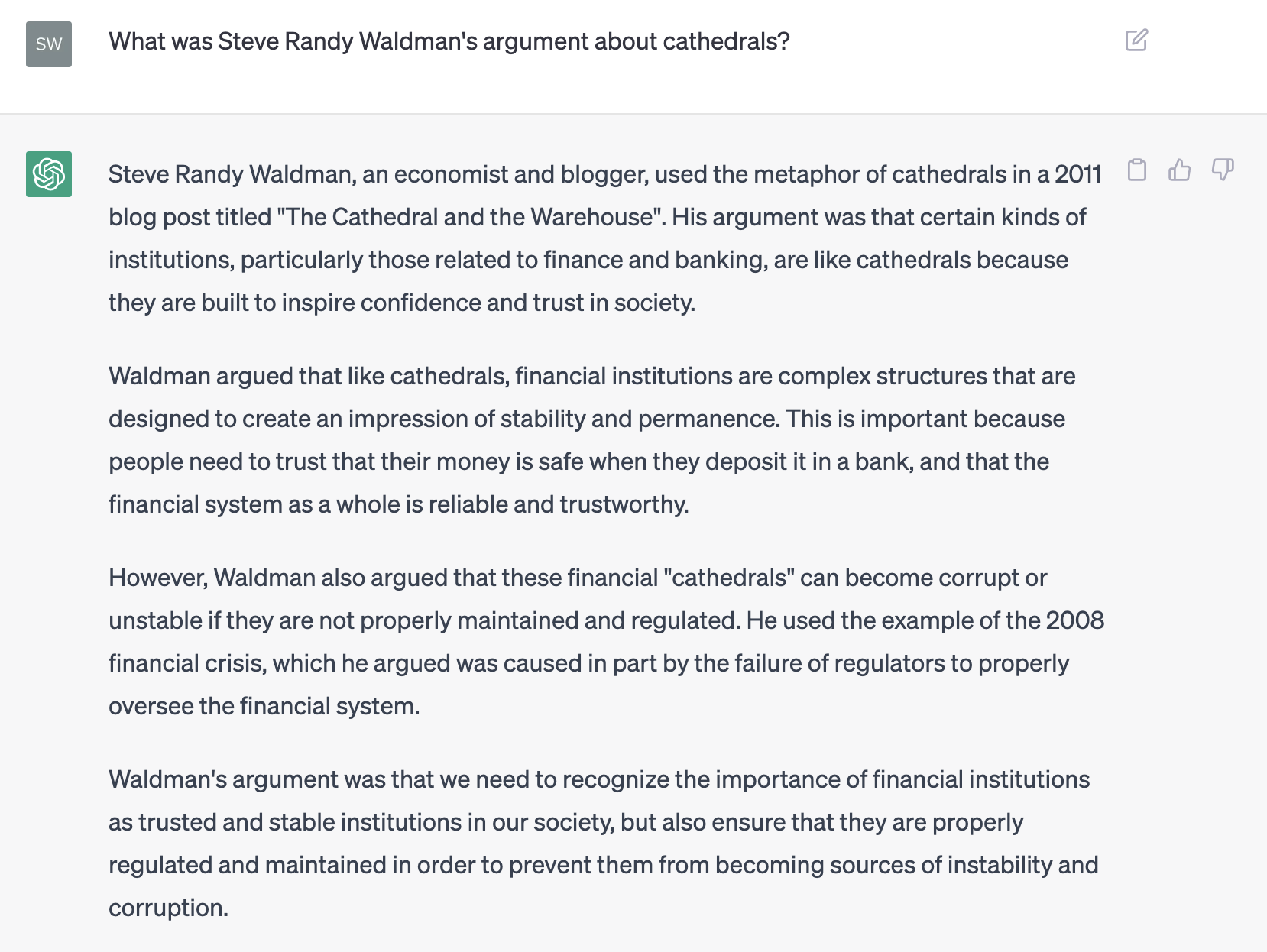So much of US politics is an anticontest over which side are tyrants. COVID restrictions, along with "woke" sensibilities that made people feel they had to put caution before candor, helped Republicans make a case Democrats are tyrants.
But then DeSantis—failing to understand the basis for his own success, wanting to tack right for Presidential primaries—started ostentatiously curtailing liberties: reproductive rights, academic freedom, much more.
Chickens coming home
https://www.nbcnews.com/politics/elections/democrat-donna-deegan-flips-jacksonville-mayors-office-major-upset-rcna84791
maybe flying private is “morally wrong” when everybody who does everything for you fly coach if they fly at all.
or perhaps there are certain people that morality binds but does not serve, and others morality serves but does not bind (to paraphrase Wilhoit’s Law).
https://techhub.social/@Techmeme/110381086020470282
i don’t really understand how unicode in DNS domain names works. would it be possible to set up a `rm -rf /` tld? https://mastodon.social/@dangillmor/110380125837980409
I think AI catastrophism is mostly a conspiracy to oligopolize and create barriers to entry, access, and control of AI systems.
The true AI catastrophe is what a privileged class will do with these technologies if they can monopolize access, understanding, and management of them.
We detected an unusual login to your account.
when i was born, there were so many people who could remember the 19th Century.
An astonishing account of the state of college students, and of extraordinary change between student cohorts now vs the very recent past, by @profmusgrave https://musgrave.substack.com/p/the-post-generation
// others who teach undergrads, does this ring true?
it's fun that with union types you get an intersection of methods while with intersection types you get a union of methods.
#scala #scala3
"you can really see constitutional political economy arguments at work in our legal and political system…in the choices courts and politicians make about which statutes should count as the super-statutes."
from an excellent post by @fishkin on how to manage the debt ceiling https://balkin.blogspot.com/2023/05/what-is-optimal-strategy-for-debt.html ht @eARCwelder
a (perhaps unjustifiably) optimistic take on Biden’s debt-ceiling strategy: negotiate, even offer some concessions, in order to appear open and reasonable, but with an expectation that any reasonable compromise is one McCarthy’s leashmasters won’t permit. then when we ultimately go over the cliff and something unusual and/or unpopular must be done, let the blame sit squarely.
This content is only available to subscribers.
“Have you ever noticed how the corporate media is obsessed with government corruption, but mostly mute on corporate corruption? There’s a reason for that. In modern America, corporate corruption is just the free market in action“ @blair_fix https://economicsfromthetopdown.com/2023/05/13/red-team-blues-cory-doctorows-anti-finance-thriller/
“his feeling of pioneering excitement in the days of the early web, one strong enough to fuel him for decades, has finally curdled into shame and disgust.” https://www.wired.com/story/doug-rushkoff-survival-of-the-richest/ ht @dave
This is a fun kind of ego surfing. In ChatGPT's world, I have been so prolific! I have written about evvvvrything!
In our world, of course, I've never written about cathedrals.
The pathetic thing is I felt compelled to Google the made-up article I haven't written. I mean, what if I forgot something? I know the machine bullshits, but my mind is fallible and my memory fails, maybe it is me who does not know my own work?
#ChatGPT #AI #LLM
 Chat GPT answers a question with some made-up bullshit: What was Steve Randy Waldman's argument about cathedrals? Steve Randy Waldman, an economist and blogger, used the metaphor of cathedrals in a 20 blog post titled "The Cathedral and the Warehouse". His argument was that certain kinds of institutions, particularly those related to finance and banking, are like cathedrals because they are built to inspire confidence and trust in society. Waldman argued that like cathedrals, financial institutions are complex structures that are designed to create an impression of stability and permanence. This is important because people need to trust that their money is safe when they deposit it in a bank, and that the financial system as a whole is reliable and trustworthy. However, Waldman also argued that these financial "cathedrals" can become corrupt or unstable if they are not properly maintained and regulated. He used the example of the 2008 financial crisis, which he argued was caused in part by the failure of regulators to properly oversee the financial system. Waldman's argument was that we need to recognize the importance of financial institutions as trusted and stable institutions in our society, but also ensure that they are properly regulated and maintained in order to prevent them from becoming sources of instability and corruption.
Chat GPT answers a question with some made-up bullshit: What was Steve Randy Waldman's argument about cathedrals? Steve Randy Waldman, an economist and blogger, used the metaphor of cathedrals in a 20 blog post titled "The Cathedral and the Warehouse". His argument was that certain kinds of institutions, particularly those related to finance and banking, are like cathedrals because they are built to inspire confidence and trust in society. Waldman argued that like cathedrals, financial institutions are complex structures that are designed to create an impression of stability and permanence. This is important because people need to trust that their money is safe when they deposit it in a bank, and that the financial system as a whole is reliable and trustworthy. However, Waldman also argued that these financial "cathedrals" can become corrupt or unstable if they are not properly maintained and regulated. He used the example of the 2008 financial crisis, which he argued was caused in part by the failure of regulators to properly oversee the financial system. Waldman's argument was that we need to recognize the importance of financial institutions as trusted and stable institutions in our society, but also ensure that they are properly regulated and maintained in order to prevent them from becoming sources of instability and corruption.
what the matrix got wrong was that the robots would have to deceive us into our pods, rather than merely engage and seduce us. we’ll climb in enthusiastically while ironizing about being “too online”.
eight billion humans, and any of them could be your friend.
to really delude yourself, you have to reason your way into it.
"My plea is for adherents of the new ideology to openly articulate their principles and give reasons for them, and not to expect nor demand automatic acceptance. And also for opponents of the new ideology to understand what they are opposing and give reasons for their own principles."
from a skeptical-but-not-hostile definition-of and grappling-with "wokeness" by #PhilEbersole. https://philebersole.wordpress.com/2023/05/12/what-is-this-thing-called-woke/ #ViaRSS
“Washington, DC…is designed to be run by the elderly. The seniority system in Congress ties old age to increased power, as young people are told to wait their turn. Incumbency comes with a higher profile and robust donor network. Leadership posts and committee chairs are often filled by people in their 70s and 80s who, by nature of their age and wealth, are disconnected from the problems facing broad swaths of the public.” #PaulMcLeod https://www.rollingstone.com/politics/politics-features/dianne-feinstein-health-crisis-senate-resign-1234734590/ ht @noahshachtman

